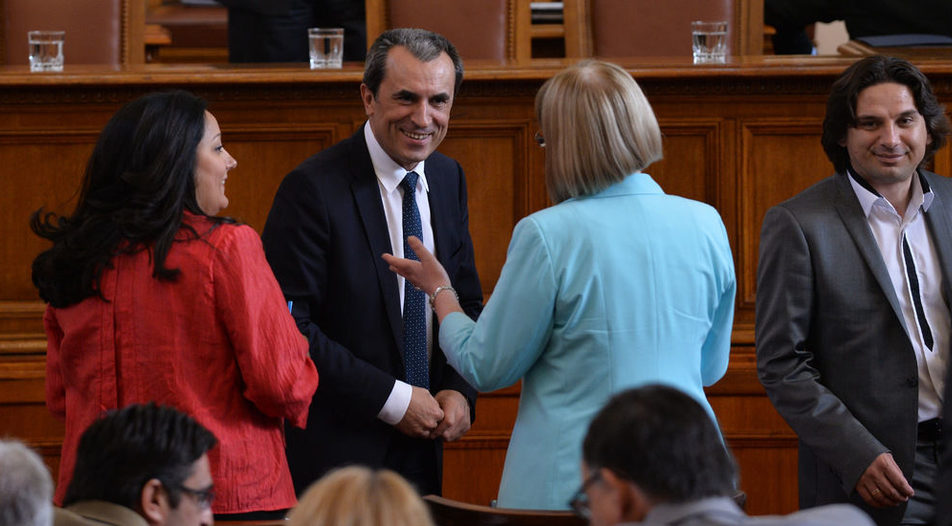Few people expected the new government of GERB and the United Patriots to come up with a bold reformist agenda which Bulgaria badly needs. But most of the appointments in top cabinet positions came as unpleasant surprises.
Most of the ministers from the previous GERB-led government (2014-2016) kept their positions, which was to be expected, even though few of them had real achievements. With the exception of Energy Minister Temenujka Petkova, who succeeded in bringing some stabilization to the energy sector, and Finance Minister Vladislav Goranov, who at least was able to keep Bulgaria's macroeconomic stability, the rest could hardly point at major improvements in their departments. There are some hopes related to the new Minister of Healthcare, Nikolay Petrov, who is a respected professional, or Education Minister Krasimir Valchev, who had been working in the ministry for years and knows the sector well. The new cabinet's digital tzar Rossen Jeliazkov, a respected former permanent secretary at the Council of Ministers, could also do a good job to push for faster digitization of the public administration.
But the appointment of the ministers of justice, the Interior and the Bulgarian presidency of the EU causes dismay. The new Justice Minister, Tsetska Tsacheva got the job only because the Prime Minister didn't want to look revengeful - Mrs. Tsacheva was GERB's presidential candidate and lost the elections in 2016. She is a staunch supporter of the status quo in the judicial branch and can hardly be expected to be a vehicle for reform. The bizarre ministry for the preparation of the Bulgarian EU presidency is headed by Lilyana Pavlova, who was regional development minister before. She got the new post as new revelations of suspected corruption practices in the Road Agency (see p. 44) emerged. The executive agency is under the umbrella of the regional development ministry. The Minister of the Interior, Valentin Radev, is seen as a tool for fending off any possible reform in the cumbersome and ineffective ministry.
GERB appointments, however, were overshadowed by those made by their coalition partner, the United Patriots. Apart from the top roles in the ministries of economy (see p. 46) and defense (the new defense minister Krassimir Karakachanov's past as an agent of the Communist-era State Security service would make many in NATO nervous) and the meaningless position of Vice-PM for Demography (which Valeri Simeonov received as a token of respect from Mr. Borissov), they have a couple of other interesting and controversial appointments in key positions. What all of these nominations show is that the United Patriots lack expertise, but they are ready to "rent out" their quota.
The new Deputy Minister of Energy Krassimir Parvanov is an ex-head of the National Electricity Company in the first Borissov government. He was fired by the then Energy Minister Traycho Traikov for insubordination in his negotiations with Russia's Atomstroyexport on the ill-fated Belene Nuclear Power Plant project. Following the appointment, an employers' association wrote an open letter to PM Borissov, in which they called Mr Parvanov "a man with bad reputation and subject to energy business interests".
Nazi-salute fans (Pavel Tenev, Deputy Minister of Regional Development and Ivo Antonov, head of the Social Activities Directorate in the Defense Ministry), had to resign even before their first days on the job, after pictures of each of them making a Nazi salute surfaced from their Facebook profiles. "When I think about what funny pictures we were taking (in Buchenwald, a Nazi-era concentration camp in eastern Germany) in the 70s, would somebody ask me to resign and go back to my village", Vice PM Valeri Simeonov from NFSB said in defense of his appointees.
Nikolay Pehlivanov, who became governor of Sofia Region, is a real estate entrepreneur who invested in several large resorts on the Bulgarian Black Sea coast. Also an owner of the Green Life resort near the coastal town of Sozopol. It is interesting that as governor he will control construction activities, i.e. as an official he needs to oversee his business activities (even if they not done formally in his name).
Few people expected the new government of GERB and the United Patriots to come up with a bold reformist agenda which Bulgaria badly needs. But most of the appointments in top cabinet positions came as unpleasant surprises.
Most of the ministers from the previous GERB-led government (2014-2016) kept their positions, which was to be expected, even though few of them had real achievements. With the exception of Energy Minister Temenujka Petkova, who succeeded in bringing some stabilization to the energy sector, and Finance Minister Vladislav Goranov, who at least was able to keep Bulgaria's macroeconomic stability, the rest could hardly point at major improvements in their departments. There are some hopes related to the new Minister of Healthcare, Nikolay Petrov, who is a respected professional, or Education Minister Krasimir Valchev, who had been working in the ministry for years and knows the sector well. The new cabinet's digital tzar Rossen Jeliazkov, a respected former permanent secretary at the Council of Ministers, could also do a good job to push for faster digitization of the public administration.












